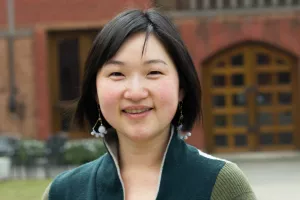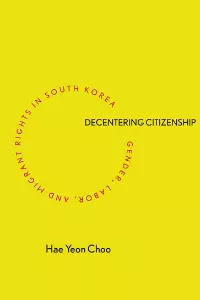
Women’s work: New book by UTM prof examines migrant labour and citizenship in South Korea
A new book by a U of T Mississauga sociology professor Hae Yeon Choo reveals how inequalities of gender, race and class affect migrant workers’ rights and citizenship in South Korea.
In Decentering Citizenship: Gender, Labor, and Migrant Rights in South Korea, Choo examines the experiences of Filipina women employed in the suburbs of Seoul. Choo spent 18 months observing and interviewing the women—factory workers, bar hostesses and “marriage migrants”—examining how they integrated with, or were excluded from, South Korean society.
“When we look at migrants, we see how people must navigate the paradox of social inequality with the promise of equal membership,” says Choo. “It’s not an abstract idea of human rights or citizenship, but rather day-to-day negotiations that these migrants undertake as mothers, as workers, as women.”
“I was interested in how these migrants negotiate their rights, and what it means for them to be South Korean,” she says. “Social inequality of race, gender or class significantly shapes migrant rights in very concrete ways.”
Choo cites immigration raids in working class neighbourhoods, surprise document checks in public spaces, lack of worker rights, and hostility or dismissive treatment from South Koreans as some of the daily indignities suffered by migrants. “People talk down to them, underpay them or avoid interacting with them,” she says. “For many undocumented migrants, being “illegal” poses an added stigma, as some South Koreans perceive them as law-breakers and criminals.”

There are about 1.57 million migrants in South Korea, accounting for about 3.1 per cent of the national population. This includes about 24,000 Filipina women with temporary visas to work in factories or as “entertainers” in hostess bars, as well as about 10,000 ‘marriage migrants’ wed to South Korean men. A further 5,500 women are considered undocumented, employed in factories or performing domestic work.
South Korea’s strong sense of national ethnic identity and stringent labour laws that require workers to return to their home countries keep migrant workers on the edges of society, making it difficult to integrate into the culture, achieve permanent residency or make plans for the future.
“Women who come through marriage have the best possibility of long-term stabilization and permanent residence,” Choo says.
Migrant factory workers are typically paid less than their Korean peers, but are able to gain agency through their contribution to the economy. “Factory workers manage to develop rights and agency because they provide necessary labour and can develop skills,” Choo says. “If you are there longer, you develop skills and have a better standing to negotiate with employers. Coupled with a highly supportive network of labour and religious organizations who advocate for worker rights, migrant factory workers have a better chance at establishing citizenship.”
“Club hostesses may share the same legal status as temporary labourers, but their access to labour rights and social rights are different,” Choo says, noting that women working as hostesses are valued for their youth and “freshness” rather than learned skills. They are circulated through the club system by agents, and returned to the Philippines after a year or two.
“There’s a strong feeling that people who are not ethnically Korean as outsiders or don’t belong,” she says. “When non-ethnic Koreans claim belonging, they must make the claim of belonging through social standing. Women who marry Korean men make that claim as mothers of Korean children, and factory workers build skills and contribute to the economy, but hostesses don’t have access to the citizen worker or maternal citizen pathways to citizenship.”
Despite the challenges, Choo sees reason for hope. South Koreans are slowly changing their opinions about migrant workers. “For those who interact with migrants, it is an occasion to rethink what it means to live in a global Korea that has become an economic destination. It can be a source of pride—we used to be a poor country that sent people overseas, and now, people are coming here to work. Even though they are not going overseas, they see themselves as participating in Korea’s globalization.”
